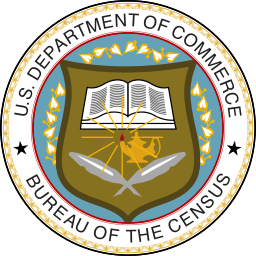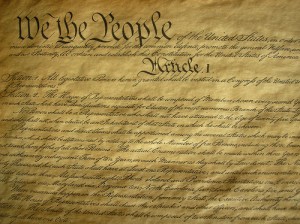Constitution
Census long form: required?

On two different occasions I’ve been contacted by people who have received the American Community Survey (formerly known as the long form census). These people felt their privacy was being violated by the intrusive questions in the survey and that the federal government did not have the right to demand such information of them. They were being hounded by census bureau workers, threatened with fines and in one case even had a bureau employee show up at their church to serve them with papers.
These people turned to me, as a Constitution Party state chairman (Washington State), wanting to know if the survey really is mandatory and whether they would indeed be fined for not complying. Knowing that millions of other Americans are being confronted with this same dilemma, I decided to compile my findings as a public resource on the matter.
Background: The Census

Headquarters of the United States Bureau of the Census, Suitland, Md., 2007. Photo courtesy Bureau of the Census.
It all began in 1789 with the drafting of the United States Constitution where Article I, Section 2 calls for an “enumeration” to be made once every ten years for the apportioning of representatives and direct taxes among the several states.
The nation’s first census was conducted in 1790 and consisted of only the name of the head of household and the number of other residents – just what you’d expect for a simple enumeration. However, by as early as 1810 the census had added inquiries regarding U.S. manufacturing capabilities with questions about social matters coming in 1850. In 1940 the dual long form/short form system was put into play with most households receiving the short form census with questions more appropriate to a simple enumeration and a portion of households receiving the long form census seeking detailed demographic information.
With the unpopularity of the intrusive long form leading to a decline in the census response rate and the government seeking more accurate demographic data, the Census Bureau began developing and implementing the American Community Survey in the late 1990s. As of 2010, the long form census was phased out with a simple short form type of census being conducted every ten years as the means of enumerating the population. The28 page American Community Survey is now being sent to roughly 3.5 million homes every year as the means of collecting the detailed information that an increasingly centralized and socialized form of government seeks.
The primary reason being given for the American Community Survey and its questions on everything from education level to whether you have a bathtub, what kind of fuel your vehicle uses and whether you receive food stamps, is that the information is needed “to determine how more than $400 billion dollars of federal funding each year is spent.” The problem with this is that I don’t see any activities authorized in Article I, Section 8 of the U.S. Constitution, that would involve dolling out money to state and local governments, or to other agencies or programs, and which would require this kind of data.
Is participation required by law?
My search for information first took me to the American Community Survey website where I found a page addressing the question of “Is the American Community Survey Mandatory?” That page references three sections of U.S. Code as being “relevant laws.” The first two (18 U.S. Code § 3571 and 18 U.S. Code § 3559) simply deal with classifications of federal offenses and associated fines, but contain no reference to the census or American Community Survey.
The third section of U.S. Code referenced is “13 U.S. Code § 221 – Refusal or neglect to answer questions; false answers.” This section prescribes a $100 fine for refusal or neglect by any person over the age of 18 to answer “any of the question on any schedule submitted to him in connection with any census or survey provided for by subchapters I, II, IV, and V of chapter 5 of this title.” Those subchapters do not mention the American Community Survey by name, nor address its specific questions. However, subchapter II, § 141, section (a) states that:
“The Secretary (this is the Secretary of the Department of Commerce which is over the Census Bureau) shall, in the year 1980 and every 10 years thereafter, take a decennial census of population as of the first day of April of such year, which date shall be known as the “decennial census date”, in such form and content as he may determine, including the use of sampling procedures and special surveys. In connection with any such census, the Secretary is authorized to obtain such other census information as necessary.”
Subchapter IV, § 182 states:
“The Secretary may make surveys deemed necessary to furnish annual and other interim current data on the subjects covered by the censuses provided for in this title.”
This as a good example of bad legislation – something so broad and vague as to allow government attorneys to argue that the Secretary has been authorized to procure any information, about anything, from anyone, anywhere, at anytime. Good legislation holds the reins of government rather tightly and jealously guards delegated authority, specifying in detail the limits of the authority being conferred upon agencies and administrators.
So yes, the survey can be said to be required by the U.S. Code and a $100 fine can be applied, but that’s not the end of the story.
Is the law lawful?
[ezadsense midpost]
To be lawful, all law must spring from a source of authority. All authority flows by chain of command hierarchy from a superior that possess authority to a subordinate to whom a measure of the superior’s authority is delegated. A subordinate entity can never claim for itself authority that has not been delegated to it by a superior entity that actually possess the authority. An entity might take to itself the raw power to enforce its will upon others (i.e. at the barrel of a gun), but without properly delegated authority, such an act is unlawful.
All authority flows first from God (who possess “all authority”) to man, then from man to government by the consent of the governed, as described in the Declaration of Independence. The precise amount of authority delegated by “we the people” to our federal government, can be easily discovered in the plain text of the United States Constitution. Anything not specifically enumerated in that document as being delegated to the federal government is “reserved to the states respectively, or to the people” (Tenth Amendment).
So the question is, what article and section of the U.S. Constitution authorizes Congress to collect detailed demographic data on the citizens of the union states? Answer: None! The closest provision is that mentioned earlier in Article I, Section 2 which calls for an “enumeration,” i.e. “a numbering,” of the persons within the union states for the apportioning of representation and direct taxes. I’m hard pressed to imagine a way to stretch that to cover fining people for refusing to tell the government whether they have a flush toilet.
In the past few sessions of Congress, bills have been introduced to “make participation in the American Community Survey voluntary, except with respect to certain basic questions, and for other purposes.” While this would appear to be a step in the right direction, it leaves the non-Constitutionally authorized survey in place and even legitimizes it by affirming that “certain basic questions” and “other purposes” will still be mandatory. The proper action would be for Congress to pass a bill acknowledging that the federal government has no authority to collect any information from the citizens of the union states except that which is necessary to achieve an accurate enumeration, that the Secretary of the Department of Commerce is hereby ordered to cease the collection of all additional data and that all sections of U.S. Code authorizing the collection of such additional data are “hereby stricken!”
Will you be fined?
Just because something lacks Constitutional authorization, and therefore the force of law, doesn’t mean the government won’t try to enforce it or the courts uphold it. Nevertheless, for those wishing to opt out of the survey, there is encouraging news. It appears that the Census Bureau’s policy is to “NOT” prosecute and that there has not been a prosecution since 1970.
In a January 2014 article from Tulsa’s KRMG news radio website, Census Bureau Assistant Division Chief, Tim Olsen, is quoted as saying that “the Census Bureau is not a law enforcement agency. We are fully reliant upon public cooperation, and so we do not refer people on to the Justice Department for prosecution.”
An article at PolitiFact had the following to say:
“Our search for more information yielded a Jan. 9, 2013, commentary by David Whiting of the Orange County (Calif.) Register quoting a bureau spokeswoman, Jennifer Smits, saying that nobody had been fined for failing to participate to date. By telephone, bureau spokeswoman Stacy Gimbel Vidal told us that remains so; no fines have been levied. The bureau, she said, is “really not in the business of prosecuting people who don’t comply.”
…Bureau spokesman Brian Lavin told us by email that “no one has been prosecuted for failing to respond to a survey since the 1970 census.”
So if a bureau worker tells you that you “could” be fined, they’re telling the truth. However, if they say you “will” be fined, then they’re lying and are merely using a coercion tactic that relies on something that hasn’t been used in 45 years.
Should I participate in the survey?
The question of whether to participate in the American Community Survey, or any federal survey or questionnaire not clearly authorized by the U.S. Constitution, is you’re call. I’m not offering legal advice and I’m certainly not telling anyone what to do.
As a Christian man, I seek to comply with all just laws, properly constituted institutions of civil government and duly authorized actions of that government. However, when government I admit that the survey itself isn’t a big deal. I mean, it isn’t like I really care who knows whether I live in a mobile home, went to college or what kind of Internet connection I have. Just ask me and I’ll be happy to tell you – I’ll even post it on Facebook.
For me, the primary issue isn’t about privacy or the invasive nature of the questions contained in the survey. The real issue is the usurpation of the Constitutional limits placed upon the federal government. Usurpation paves the road to tyranny, and not always by one great act of usurpation, but by a thousand small ones that eventually leave a society so paralyzed that it finds itself incapable of resisting the final act that takes the last of its liberty.
For more insights on this topic, listen to this interview by former Missouri State Representative, Cynthia Davis, with her guest, Constitutional scholar and student of American history, Scott Bradley.
[ezadsense leadout]
Bob Peck is a Christian, Constitutionist and political activist who serves as the chairman of the Constitution Party of Washington and is a member of the Constitution Party National Committee. Bob lives in Spokane Valley, Washington where he is a landlord-handyman. If, like Bob, you find yourself feeling betrayed by a two party duopoly that no longer represents your values, then check out the Constitution Party at www.constitutionparty.com or call 1-800-2VETOIRS and ask for a free information packet.
-

 Civilization3 days ago
Civilization3 days agoA Better U.S. Strategy for Greenland Than Annexation
-

 Education3 days ago
Education3 days agoIgnoring the Science: The Curious Case of Cell Phone Bans
-

 Guest Columns5 days ago
Guest Columns5 days agoWaste of the Day: Thousands of Earmarks in Illinois State Budget
-

 Education4 days ago
Education4 days agoA Solid Core Enlivens Free Speech and Viewpoint Diversity
-

 Civilization4 days ago
Civilization4 days agoEnd the Filibuster – Or Stop Pretending To Govern
-

 Executive3 days ago
Executive3 days agoWaste of the Day: Utah University Trustees Don’t Know Their Job
-

 Executive4 days ago
Executive4 days agoWaste of the Day: $8 Water Filter Costs the Government $156
-

 Civilization2 days ago
Civilization2 days agoTrump’s Longest Speech, His Shortest Margin for Error














